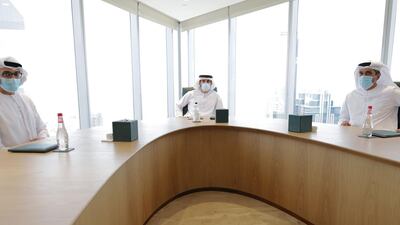In his book The Alchemy of Happiness, the 11th century philosopher Abu Hamid Al Ghazali wrote: "He who knows himself is truly happy". The pursuit of happiness and self-knowledge are linked.
Last week Dubai Government published the 2019 results of its Government Employee Happiness Index. This annual survey, in its fifteenth year, seeks to quantify the contentment of government workers across the emirate. The survey assesses job satisfaction, job loyalty, positivity and functional harmony – all critical indicators of employee happiness and subjective well-being.
This year the happiest employees in Dubai reportedly work at the Dubai Statistics Centre, closely followed by those at Dubai Public Prosecution and then at Dubai Police. The report also mentions the departments scoring the lowest on the employee happiness index.
This is not done in a name-and-shame or punitive manner, but rather in a healthy spirit, identifying actions for improvement and emphasising the need for that action. Dubai Government has set the goal of creating "the world's happiest work environment".
During the course of a lifetime, the average person will spend 90,000 hours at work. That is the figure arrived at by Jessica Pryce-Jones in her book, Happiness at Work. If we are to spend so much of our lives on the job, we need to get it right and be satisfied.
If it matters, measure it. This is what the Dubai Government is doing because workplace happiness matters. A wealth of research indicates that employee well-being is associated with increased productivity, creativity, lower rates of sickness, absence and less presenteeism – that is, being present at work for more hours than required.
In a review of the research on this topic published in Occupational Medicine, the authors of Well-being–absenteeism, presenteeism, costs and challenges, Cary Cooper and Philip Dewe, both professors of organisational psychology, concluded that workplace well-being interventions make good business sense. With such reviews being written, it is hardly surprising that over the last decade the number of sessions devoted to well-being at the World Economic Forum meetings has doubled.
Taken to an extreme, dissatisfaction at work and employee dysphoria – or unease – can lead to organisational sabotage. Rather than being cheerleaders for the organisation, employees can become its most fierce and vocal critics. None of this is good for business or customer satisfaction.
Beyond productivity, efficiency and economic considerations, focusing on employee happiness is simply the right thing to do. It is a moral question. Knowingly making employees unhappy or not caring about their well-being may be cruel but is hardly unusual.
Sadly, fear, shame and other outdated intimidation tactics are still used to lead teams. In this day and age, the "strongman" leadership style tends to result in the haemorrhaging of talent and the cultivation of sycophantic, self-serving cronyism.
The Dubai government survey and the transparent sharing of results go some way towards safeguarding the well-being of employees and promoting organisational excellence. At the very least, such surveys may occasionally lead to the removal of factors and in some cases, people, that contribute to toxic work environments.
I recently dealt with a Dubai government department (Dubai Business Events and City Operations) as we hope to bid to host an international psychology conference. The person I dealt with was highly motivated, positive, supportive and solution-focused. For me, these are the attributes of a person who is happy in their work. Such happiness is infectious and it leaves customers – in this case, me – feeling equally positive.
I admit, my sample of one employee is hardly representative but it illustrates the impact happy employees can have on customers. This is something I suspect many people have experienced at some point. Just as we cannot generalise employee happiness based on a single encounter, we cannot accurately measure happiness at the workplace with self-report surveys, even if we administer them to thousands of employees.
Hedonometry, the scientific measurement of happiness, has a long history going back to British philosopher Jeremy Bentham. For Bentham, the best we could hope to measure were proxies of happiness – things people do and say when they feel happy. The behavioural self-report survey, measuring proxies of happiness, is still going strong. Common proxies or stand-ins for workplace happiness include measures of job satisfaction, organisational commitment and task engagement.
Such surveys, of course, have their limitations. We have to consider the non-responders and the fact that a seemingly high average score of an organisation can mask deep inequalities in happiness experiences between employees who are at different levels or in different teams. Yes, senior managers may love it, but some folks at lower grades may have good reason to hate every working minute or every working day. Another nuance that needs to be considered is culture. We know from intercultural research that frequency and preference of emotional expression – joy, serenity, euphoria, anger – vary across work cultures.
Self-report surveys are not perfect but they are a good start; blunt and imprecise but far better than effortless ignorance. Fancy futuristic methods based on advances in neuroscience, data science, emotion detection and big data are on the way. In a few years, these additional data sources may be combined or 'triangulated' to give us a more accurate picture of employee satisfaction.
The first step towards happier organisations is knowing what people are happy and unhappy about. Only the organisation that knows itself can be truly happy.
Justin Thomas is a professor of psychology at Zayed University


